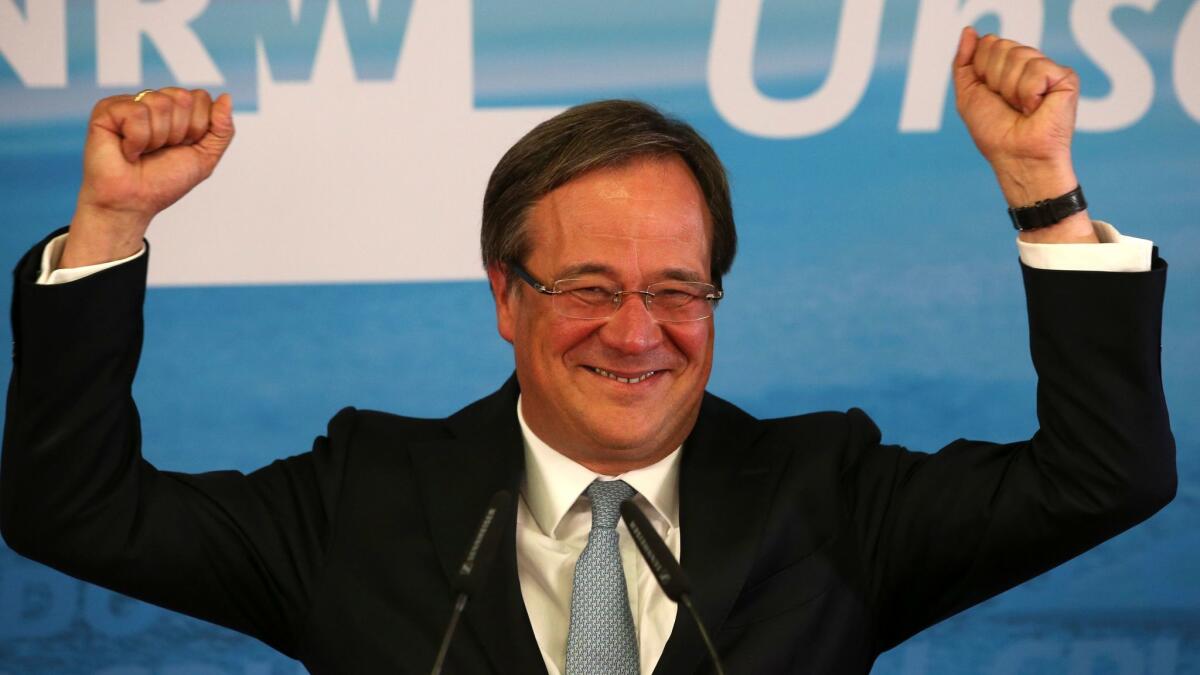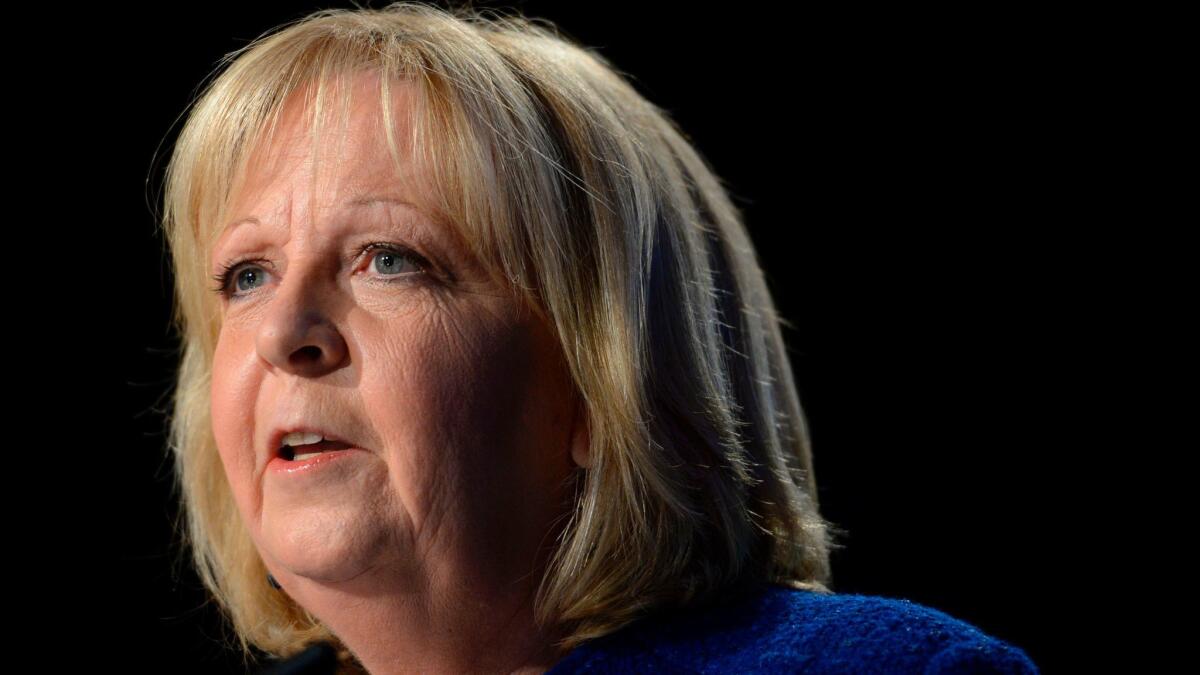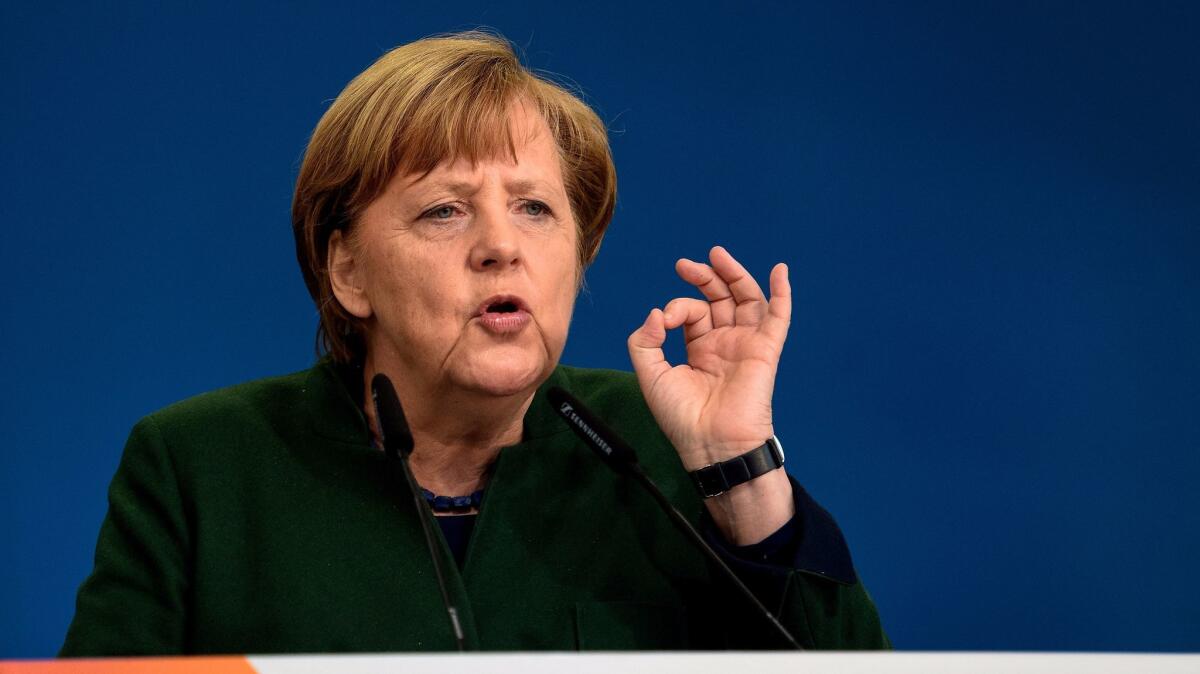Germany’s Angela Merkel racks up another come-from-behind victory

- Share via
Reporting from BERLIN — Voters in Germany gave Chancellor Angela Merkel’s conservative party its third straight regional election victory in less than two months with a thumping upset win Sunday over the ruling Social Democrats in the country’s most populous state.
The conservatives’ improbable come-from-behind triumph in heavily industrial North Rhine-Westphalia, long a bastion for the Social Democratic party and home to nearly a quarter of Germany’s voters, gave the chancellor a powerful gust of tailwind just four months before the federal election on Sept. 24.
Palpable frustration over worsening traffic congestion and crime that has plagued the crowded northwestern state, which borders the Netherlands and Belgium, were the decisive factors behind the Social Democrats’ sudden demise after the party had ruled there for 46 of the last 51 years.

Within minutes of the polls closing, the state’s governor resigned, saying she took “personal responsibility for the defeat,” which amounted to her party’s worst showing in the region since World War II.
“I did the best I could,” said Gov. Hannelore Kraft.
Merkel’s conservative allies celebrated the unlikely win with shouts of joy and champagne toasts at raucous victory parties in Berlin and in the state capital, Dusseldorf.
The election in North Rhine-Westphalia came just three months after national opinion polls showed the Social Democrats and their charismatic new leader, Martin Schulz, pulling ahead of Merkel’s conservative Christian Democratic Union for the first time in 11 years.
“I’m not a magician,” said a dejected Schulz at his party’s headquarters in Berlin, describing it as a bitter defeat in his home state. The rout seemed to confirm opinion polls that show the Social Democrats fading fast at both the state and national levels.
Merkel, who has won three federal elections since 2005, was beginning to show signs of fatigue earlier this year following a steady drumbeat of criticism over her 2015 decision to allow more than 1 million refugees into Germany.
But the 62-year-old chancellor appeared to be only rejuvenated by the sky-is-falling fears from some within her party. Her recent international travels to Washington to meet President Trump and to Russia to meet President Vladimir Putin have helped reinforce her image at home as a global figure and as a steady hand at a time of international turmoil.
“This is a very big win indeed for Merkel because it’s going to silence her opponents inside her party,” said Gero Neugebauer, a political scientist at Berlin’s Free University. “At the same time, she’s also dealt the [Social Democrats] a major defeat by taking away control of a state they thought they owned.”
Projections based on exit polls and early vote counts showed the Christian Democrats winning 33% of the vote, up from 26% in the last election in 2012.
The projections showed the ruling center-left coalition of the Social Democrats and Greens taking a clobbering, with the two parties getting 31.5% and 6%, respectively, down sharply from five years ago. The Christian Democrats will most likely try to form a government with the pro-business Free Democrats, which won 12%, or with the defeated Social Democrats as junior partners.

Merkel’s party scored a similar upset win over a Social Democrats-Greens coalition in the rural northern state of Schleswig-Holstein on May 7 after pulling off an unexpectedly strong win in the small state of Saarland, on the French border, on March 26. The March victory prompted Trump to place a congratulatory call to Merkel just nine days after they had talked about the state elections at the White House.
Nearly 18 million people live in North Rhine-Westphalia, home to four of the country’s nine largest cities, including Cologne and Dusseldorf, as well as to 10 million cars. The number of cars has jumped by more than 1 million since 2011, though the population has remained steady and the number of construction sites has risen dramatically.
A German motorist association went to the trouble of tallying the total number of recorded traffic jams in the last year — 218,000, an increase of 20% from 2015. That’s an average of about 600 notable jams in the state every day in 2016. The total mileage of traffic backed up in North Rhine-Westphalia last year stretched to 242,500 miles, or more than double the 100,625 miles recorded in 2012.
ALSO
Amid tight security, Emmanuel Macron becomes youngest French president, vows to fight terrorism
Hospitals in Britain struggle to restore their computer systems in wake of cyberattack
German army officer posed for months as a Syrian refugee and planned an attack, prosecutors say
Kirschbaum is a special correspondent.
UPDATES:
2:35 p.m.: This article has updated figures, quotes, analysis.
This article was originally published at 10:55 a.m.
More to Read
Sign up for Essential California
The most important California stories and recommendations in your inbox every morning.
You may occasionally receive promotional content from the Los Angeles Times.













